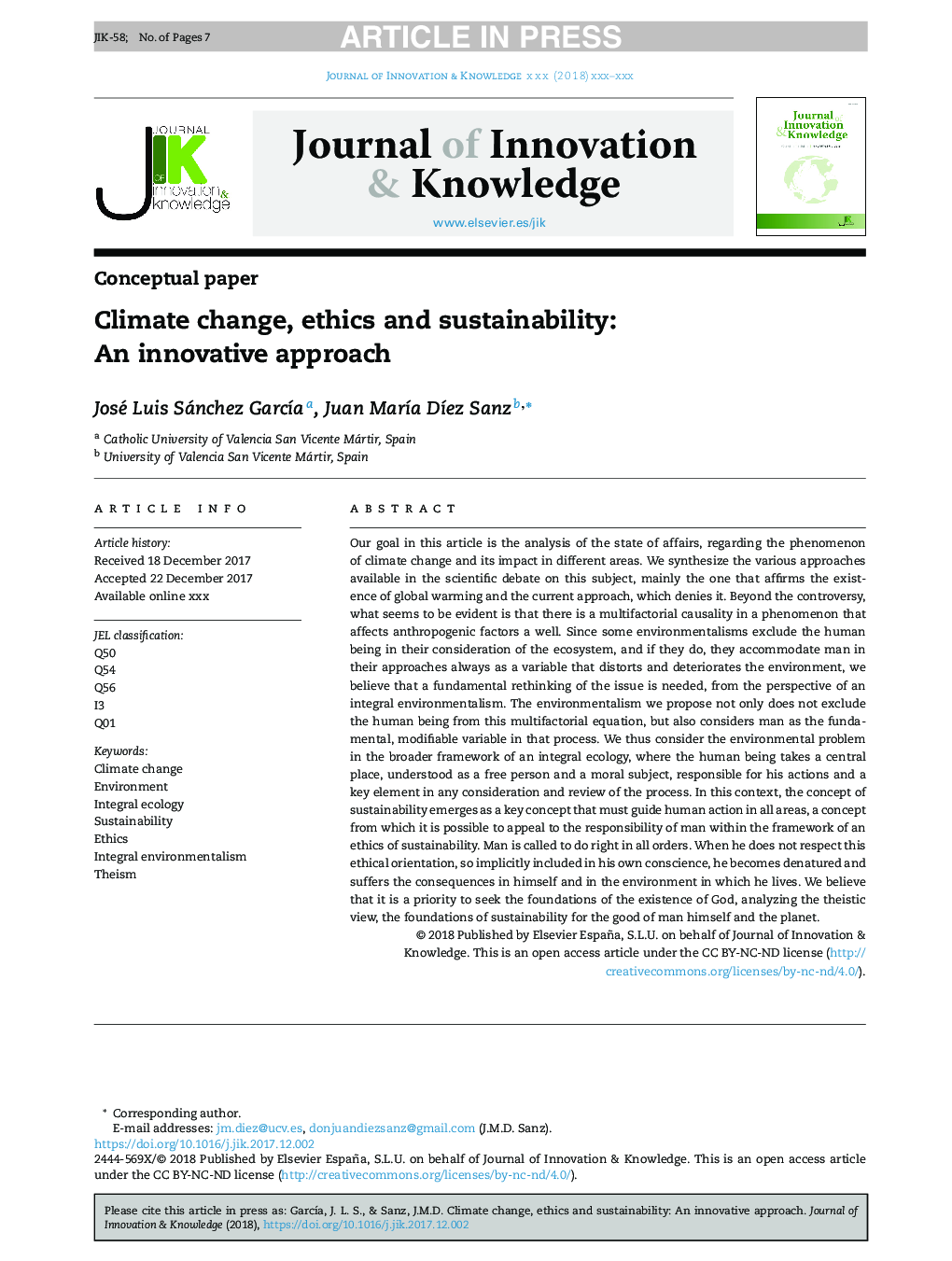| کد مقاله | کد نشریه | سال انتشار | مقاله انگلیسی | نسخه تمام متن |
|---|---|---|---|---|
| 7429292 | 1483358 | 2018 | 7 صفحه PDF | دانلود رایگان |
عنوان انگلیسی مقاله ISI
Climate change, ethics and sustainability: An innovative approach
ترجمه فارسی عنوان
تغییرات اقلیمی، اخلاق و پایداری: رویکرد نوآورانه
دانلود مقاله + سفارش ترجمه
دانلود مقاله ISI انگلیسی
رایگان برای ایرانیان
کلمات کلیدی
ترجمه چکیده
هدف ما در این مقاله تجزیه و تحلیل وضعیت امور مربوط به پدیده تغییرات اقلیمی و تاثیر آن در مناطق مختلف است. ما رویکردهای متنوعی را که در بحثهای علمی در مورد این موضوع در دسترس است، عمدتا آن چیزی است که وجود گرمایش جهانی و رویکرد فعلی را تأیید می کند، که این را انکار می کند. فراتر از جنجال، آنچه به نظر می رسد آشکار است این است که در یک پدیده علیت چند وجهی وجود دارد که به خوبی بر عوامل فاجعه آفرین است. از آنجایی که برخی از محیط زیست، انسان را در نظر گرفتن اکوسیستم خود محروم نمیکند، و اگر آنها را انجام دهد، انسانها را در رویکردهای خود قرار می دهد، همیشه به عنوان متغیری که محیط را تحریف و تضعیف می کند، ما معتقدیم که بازنگری اساسی از این مسئله از سوی چشم انداز یک محیط زیست جامع. محیط زیستی که ما پیشنهاد می دهیم نه تنها انسان را از این معادله چند ضلعی محروم نکنیم، بلکه انسان را به عنوان متغیر اساسی و قابل تغییر در آن فرایند می داند. بنابراین، مسئله زیست محیطی را در چارچوب گسترده ای از یک محیط زیست جامع در نظر می گیریم، جایی که انسان در جایگاه مرکزی قرار می گیرد، به عنوان یک فرد آزاد و یک موضوع اخلاقی شناخته می شود، مسئول اقدامات او و یک عنصر کلیدی در هر گونه بررسی و بررسی روند . در این زمینه، مفهوم پایداری به عنوان یک مفهوم کلیدی که باید اقدام انسان را در همه حوزه ها هدایت کند، مفهومی است که از آن می توان به تجدید نظر به مسئولیت انسان در چارچوب یک اخلاق پایدار، تجدید نظر کرد. مرد خواسته شده است که در تمام دستورات درست عمل کند. هنگامی که او به این جهت اخلاقی احترام نمی گذارد، به طور ضمنی در وجدان خود گنجانده می شود، او دنج می شود و عواقب آن را در خود و محیطی که در آن زندگی می کند رنج می برد. ما بر این باوریم که اولویت این است که به پایه های وجود خداوند بپردازیم، تحلیل دیدگاه تئیستی، پایه های پایداری برای نفع خود انسان و سیاره.
موضوعات مرتبط
علوم انسانی و اجتماعی
مدیریت، کسب و کار و حسابداری
مدیریت فناوری و نوآوری
چکیده انگلیسی
Our goal in this article is the analysis of the state of affairs, regarding the phenomenon of climate change and its impact in different areas. We synthesize the various approaches available in the scientific debate on this subject, mainly the one that affirms the existence of global warming and the current approach, which denies it. Beyond the controversy, what seems to be evident is that there is a multifactorial causality in a phenomenon that affects anthropogenic factors a well. Since some environmentalisms exclude the human being in their consideration of the ecosystem, and if they do, they accommodate man in their approaches always as a variable that distorts and deteriorates the environment, we believe that a fundamental rethinking of the issue is needed, from the perspective of an integral environmentalism. The environmentalism we propose not only does not exclude the human being from this multifactorial equation, but also considers man as the fundamental, modifiable variable in that process. We thus consider the environmental problem in the broader framework of an integral ecology, where the human being takes a central place, understood as a free person and a moral subject, responsible for his actions and a key element in any consideration and review of the process. In this context, the concept of sustainability emerges as a key concept that must guide human action in all areas, a concept from which it is possible to appeal to the responsibility of man within the framework of an ethics of sustainability. Man is called to do right in all orders. When he does not respect this ethical orientation, so implicitly included in his own conscience, he becomes denatured and suffers the consequences in himself and in the environment in which he lives. We believe that it is a priority to seek the foundations of the existence of God, analyzing the theistic view, the foundations of sustainability for the good of man himself and the planet.
ناشر
Database: Elsevier - ScienceDirect (ساینس دایرکت)
Journal: Journal of Innovation & Knowledge - Volume 3, Issue 2, MayâAugust 2018, Pages 70-75
Journal: Journal of Innovation & Knowledge - Volume 3, Issue 2, MayâAugust 2018, Pages 70-75
نویسندگان
José Luis Sánchez GarcÃa, Juan MarÃa DÃez Sanz,
